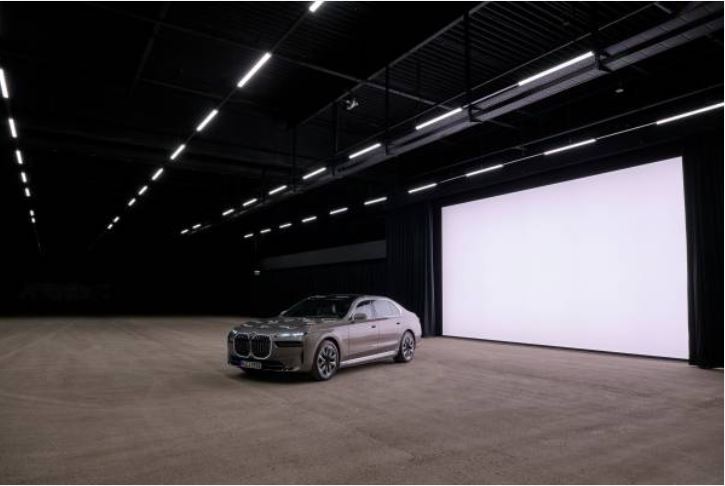+++ The BMW Group Light Channel Next is the company’s longest development tool, measuring 132 metres +++ Cutting-edge technology enables realistic simulation of different test scenarios for road illumination and lighting effects +++ Spot on in a former warehouse +++

Munich. The BMW Group now has a new light channel at its disposal for testing the headlights and exterior lighting of new models. The new Light Channel Next, constructed in a former parts warehouse in Unterschleißheim near Munich, is one of the biggest and most modern facilities of its kind in the world. It allows the designers and developers to analyse and optimise all components of the vehicle lights through precise simulation of different scenarios on real models. As well as different kinds of substrates, the ambient lighting conditions for any time of day and night can also be realistically reproduced there.
In the new light channel, the developers mainly focus their attention on the integration of highly adaptive headlights, which guarantee safe illumination of the road and surroundings as well as fatigue-free driving. As well as being an important factor in safety, however, the vehicle lights are also a question of aesthetics for all brands in the BMW Group. Daytime driving lights with a striking design are as much a part of the light equipment on current models as the illuminated BMW kidney “Iconic Glow”, the distinctive rear lights of the MINI with their Union Jack design or the dynamic light carpet, which adds a lighting effect to the vehicle’s entry area. Innovative light designs and individual lighting effects give each model an unmistakeable appearance.
“For the BMW Group, light is a topic that is constantly gaining in importance. With the new Light Channel Next, we look forward to a future of bringing innovative ideas to the vehicle and the market which will make a lasting impression on customers and enhance road safety”, says light expert Christian Jebas.
BMW Light Channel Next takes up where computers reach their limits.
When it comes to the development of new light systems, computer-aided simulations provide a solid basis. Yet despite huge advances in the field of virtual and mixed reality, a direct evaluation of the light on the real vehicle remains indispensable for the BMW Group engineers and designers. The new light channel offers the perfect conditions for this.
Measuring 132 metres, the Light Channel Next is the longest development tool in the BMW Group. The test surface is also around 22 metres wide. This means that the developers and designers have a total area of almost 3,000 square metres at their disposal. The facility also includes a workshop for preparing the prototypes for the light tests. The new light channel’s entry into operation follows around three years of construction. The location in Unterschleißheim is close to the BMW Group’s Research and Innovation Centre (FIZ) to the north of Munich.
Four ground surfaces for extensive light tests under all conditions.
One of the most important features of the new light channel is its ground conditions. Four different surfaces are available for analysing newly developed light technologies and light designs. The central area has an asphalt surface, which has undergone a special surface grinding process to artificially age it. Its reflection characteristics correspond to those of a road, making it possible to evaluate the colour and homogeneity of static or variable low-beam headlight distributions.
In addition, a footpath or even a common underground car park floor coating can be used for analysing the distinctive BMW light carpets. The developers even have access to an oiled parquet floor of the kind used for vehicle presentations at trade fairs.
BMW Light Channel Next simulates the lighting conditions at all times of day.
In order to avoid unwanted reflections from the walls or ceiling, the entire light channel is painted in a special light-absorbing matt black colour. Light traps are also mounted in the area of the walls so that the room with the exception of the floor absorbs all light. Other surfaces are deliberately designed to provide a clear visible reflection of incident light. The new light channel thus has a test wall measuring 18 metres wide and three metres high with a Lambertian radiation characteristic. This can be lowered if necessary and is used for measuring the colour fringes at the light/dark boundary of low-beam headlight distributions or for precise adjustment of the headlight tilt. The light channel’s equipment also includes a light sail measuring around 80 square metres for determining any unwanted stray light.
For evaluating signal lamps which are also active during the day, for example turn indicators or daytime driving lights, a daylight wall measuring ten metres wide and five metres high provides a large, light background. This can be varied not only in terms of luminosity, but also colour temperature. In this way, the light conditions at midday can be simulated just as well as those in the evening hours. In order to ensure a reproducible positioning of the test vehicles, the models are aligned fully automatically along the longitudinal axis by means of a centring stand. This not only increases the precision, but also saves valuable time that would otherwise be wasted on intricate manoeuvring.
As a key instrument in the development of new light concepts, the Light Channel Next will begin operation with immediate effect. Its numerous features and diverse application possibilities will help to achieve the best possible quality for the customer and greatly simplify the daily work of the engineers. The partial transformation of an existing warehouse meant it was possible to cut the costs to a minimum while maximizing the benefit for vehicle development.
TrendForce 2023 Global LED Lighting Market Analysis-1H23
Publication dates: February 10, 2023; July 31, 2023
Language: Traditional Chinese/English
File format: PDF and EXCEL
Number of pages: 100 (in each publication)
|
If you would like to know more details , please contact:
|





 CN
TW
EN
CN
TW
EN





